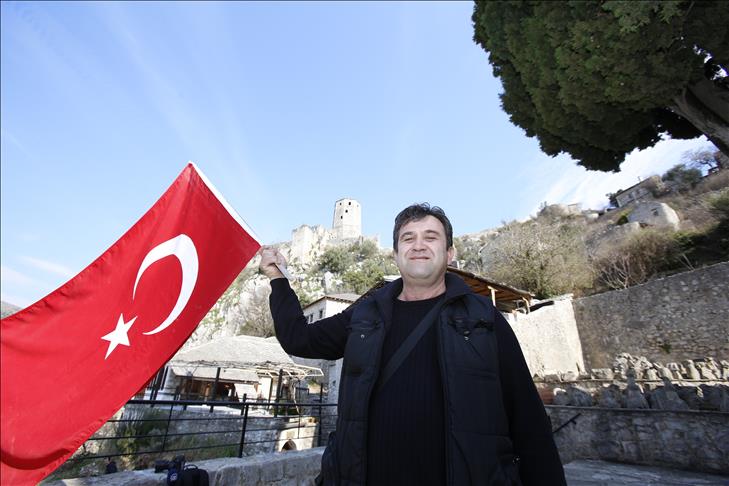
POCITELJ, Bosnia and Herzegovina
As the centenary of the Battle of Canakkale approaches on April 25, people in the Balkans region are also celebrating their war heroes.
The Battle of Canakkale, which the West refers to as the Gallipoli Campaign, is often perceived as a battle between Turks and the Anzac forces that lasted from April 1915 till January 1916. However, one overlooked fact is that thousands of people from the Balkans also fought valiantly in the decisive conflict that was led by Turkish Republic's founding father, Mustafa Kemal Ataturk.
One such individual from the Balkans was Vedad Boskailo’s great grandfather, Zulfikar Boskailo, who dedicated his life with the Ottoman Army and in the end became a martyr at the Canakkale battle.
Despite the fact that 100 years have passed since his death, stories about Zulfikar Boskailo continue to be told in the region, which is a constant source of pride for his descendants.
"My grandfather and father always told me stories about my great grandfather Zulfikar. I grew up with those stories. He was everyone's favorite in the village," Vedad Boskailo said.
Zulfikar Boskailo was born in 1850s in a small village called Pocitelj in the southern part of Bosnia. He served as a senior officer in the Ottoman Army for many years and even took part in the Ottoman-Montenegro war in 1876.
According to Vedad, after the Ottomans withdrew from Bosnia and Herzegovina in 1878 and the region came under the Austro-Hungarian Empire, Zulfikar Boskailo had refused to join the Austro-Hungarian army because he was against fighting "his own brothers and sisters."
"After the Ottoman Empire's retreat from the region, Zulfikar was riding a horse from Pocitelj to Mostar. On the way, he encountered an Austro-Hungarian Army officer, who asked him to serve on their side and was promised the same rank as he had in the Ottoman Army. However, Zulfikar rejected the offer, saying 'I do not fight against my brothers',” Vedad said.
For his refusal, Boskailo was sent to prison, but six months later he managed to flee to Turkey and never returned home. “We know all this from his letters he wrote back to his family in which he also spoke about his participation in the war in the Dardanelles," Vedad said, adding that his ancestor had sent letters to his family until early 1916.
The legend of Zulfikar Boskailo and his war heroics were so popular in the region that people named their children after him. One such personality is now 85-years-old and lives in the Gradina village. He recalled that the martyr Zulfikar was a very tall man and was known to be very brave.
“There was no one as tall as him in the region. There was also no one brave enough to approach him," the octogenarian said.
He narrated an interesting incident about how the war hero would hide his tobacco before he would go to a mosque to offer his prayers.
"There used to be two main entrances to the Pocitelj village. The one near Gradina was used by the tall Zulfikar who would leave his tobacco pouch at the top of the door before he went for his Friday prayers. He knew that since there was no one as tall as him, his tobacco would stay safe. Today, I cannot even reach that hole with my cane," he added.
During the Battle of Canakkale, around 13,000 New Zealanders and 50,000 Australians fought during the war, and at least 2,700 New Zealanders and 8,700 Australians were killed.
Ottoman forces lost almost 60,000 soldiers. Around 1,700 Indian soldiers, fighting for the British crown, also lost their lives.
Anadolu Agency website contains only a portion of the news stories offered to subscribers in the AA News Broadcasting System (HAS), and in summarized form. Please contact us for subscription options.


